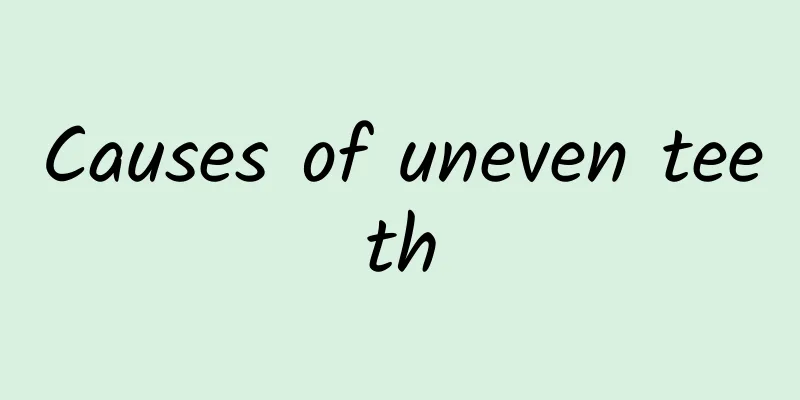Causes of uneven teeth

|
There are many reasons for uneven teeth, which is closely related to not paying attention to dental care in daily life. In addition, if malnutrition occurs during the fetal period, it may also affect the teeth and jaws, and finally lead to uneven teeth. In addition, uneven teeth also have certain genetic factors. If there is retained deciduous teeth or congenital missing teeth, such symptoms will appear. Causes of uneven teeth Congenital causes The growth and development of teeth is affected by internal and external factors of the human body. When the fetus is stimulated in the mother's body, or the mother is ill or malnourished during pregnancy, it will affect the normal development of the fetus's teeth and jaws, causing the teeth to be misaligned after they erupt. If parents have crooked teeth, this condition will be passed on to their children. Acquired causes (1) Early loss of deciduous teeth: insufficient space will occur, resulting in crowding and misalignment. The eruption guiding function is lost, and the permanent teeth become misplaced or fail to erupt. (2) Bad habits: Most of them are finger sucking habits, tongue sticking out habits, lip biting habits, object biting habits, jaw protrusion habits, bad swallowing habits, unilateral chewing habits, etc., which can cause various malocclusions. (3) Supernumerary teeth: Supernumerary teeth can cause morphological and kinetic disorders in the tooth and jaw system. Supernumerary teeth between central incisors can lead to the formation of central incisor gaps, etc. (4) Congenital missing teeth: mostly due to developmental and embryonic reasons. The missing third molars are mostly due to germline degeneration. (5) Retained deciduous teeth: When individual teeth do not fall out within the prescribed time limit, they are called retained deciduous teeth. This may result in the eruption of the successor permanent teeth being blocked and becoming buried, or the permanent teeth erupting out of the same position. (6) Insufficient wear of deciduous canines: Because children eat soft food, some deciduous canines are not worn as much as other teeth, and thus are higher than the tooth surface of the dental arch, resulting in premature contact, causing forward or lateral movement, and forming an underbite. In addition, there are many systemic factors and local disease factors: such as infectious diseases, malnutrition, endocrine factors, vitamin deficiency, cleft lip and palate, benign hypertrophy of the mandibular condyle, facial hypertrophy, etc. |
<<: What is the cause of the black inside of the teeth?
>>: Shingles blisters getting bigger
Recommend
Why does the fetus have a cystic mass?
If a cystic mass is found during examination duri...
TCM Preparing for Pregnancy and Regulating the Body
In fact, preparing for pregnancy is very importan...
What causes yellow sputum?
If the sputum you cough up is yellow, it may be c...
What to do if estrogen decreases
Hormones play a very important role in the body. ...
What causes a bitter and dry mouth?
A bitter and dry mouth is quite common in life. T...
Pin-like pain in chest after eating
Every day, we have to ensure three meals a day. E...
Polyps grow in tooth holes
Some people often eat sweets and do not pay atten...
The efficacy, effects and contraindications of Adenophora
As modern people's life pressure increases, m...
Pregnant in the same month of coarse salt hot compress
The topic of hot compress with coarse salt has be...
How is atopic dermatitis treated? What should we pay attention to?
To treat atopic dermatitis, we need to learn more...
How many stages are there for hepatic encephalopathy?
Hepatic encephalopathy is divided into four diffe...
What diseases can biochemical blood tests detect?
Biochemical examination is a relatively routine e...
What is a pituitary fibroma
Pituitary fibroma is a type of tumor that we rare...
Symptoms of Tetany
Hand and foot convulsion is a disease caused by m...
What is the reason for the baby's upper eyelid to be red and swollen
If your baby's upper eyelids become red and s...









